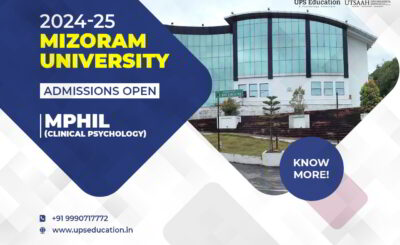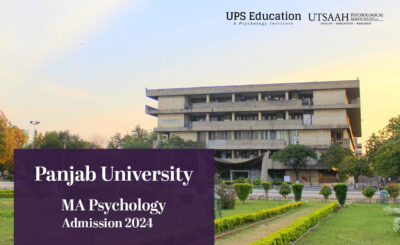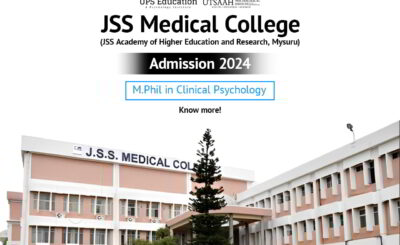![]()
MPhil in Clinical Psychology stands for Masters of Philosophy in Clinical Psychology. It used to be a 2-year post-graduation course recognized by the RCI which would make an individual eligible for a license to become a licensed clinical psychologist. However, according to the new guidelines, the MPhil course for clinical psychology will be discontinued. Let us look into this further as we highlight some key points about this change.
Impact of NEP 2020
There have been recent waves in the education system of India. The National Education Policy 2020 has its main focus on revamping the previous structure of educational institutions in such a way that knowledge is distributed to the students to equip them with skills and practical application of theories and principles. More emphasis has been placed on a holistic hands-on approach to learning rather than the exam-centered pattern of before. It also aims at forming a uniform course-credit system and multiple possible entry and exit points to make it easier for students to shift institutions.
All courses have been modified and revamped to some extent according to the reforms as given by the University Grants Commission (UGC) and NITI Aayog. In this article, we will go through the changes made in the professional courses of Clinical Psychology.
Also Read: UGC Decision on MPhil Clinical Psychology
What is RCI?
The Rehabilitation Council of India (RCI) was established by an Act of the Parliament as a statutory body. Its purpose is to assess educational programs and strategies that are introduced and implemented in the field of special education and disability. With the advent of NEP, the RCI is responsible for ensuring that rehabilitation is taking place in alignment with the new credit system and revamping educational programs in the areas of special education and disability.
Key Points Regarding the Change
- New intake in MPhil in Clinical Psychology course will continue as a valid up to the academic year of 2025-26 only.
- 2 years M.Psy (Clinical Psychology) which stands for Masters of Psychology in Clinical Psychology will be a new course to obtain a license of Clinical Psychologist in place of the existing M.Phil Clinical Psychology Course.
- The Professional Clinical Psychology courses will now include Credit Point as per NHEQF Level 6.5 to 8.
- Restructure and standardization of course syllabus for PG diploma, M.Psy, and Psy.D.
- Multiple entry and exit points are introduced for the flexibility of students.
- Changes in eligibility for entry into the professional Clinical Psychology courses.
The new guidelines have discontinued the MPhil course for clinical psychology but those who are pursuing it or have been practicing under it must not worry as RCI has provided us with the next steps forward that have been listed above.
Procedure to Become a Clinical Psychologist Under New Guidelines
According to the new criteria, there are new courses being provided to pursue clinical psychology after the completion of a valid Bachelor’s degree (which can be of 4-years according to NEP or of 3-years, more on that further in the article). There are primarily three courses being offered, namely, a Postgraduate Diploma (PG Diploma), Master of Psychology (M.Psy) and Doctor of Psychology (PsyD). Certain professions have been awarded to all these courses. Let us highlight these.
PG Diploma (Clinical Psychology)
PG Diploma in Clinical Psychology is a 1-year postgraduate course which awards candidates with the option to register with the RCI as ‘Clinical Psychologist (Associate)’ under CRR given they have successfully completed the course. Those who graduate from this course can begin from Year 2 in the M.Psy course for clinical psychology if they want to proceed further. Those who have acquired the Professional Diploma for Clinical Psychology can also apply for M.Psy if they meet the eligibility criteria.
M.Psy (Clinical Psychology)
MPsy is a 2-year course and upon its successful completion with the required credit score, individuals can register as a “Clinical Psychologist” in accordance with the RCI under CRR. They can function independently as clinical psychologists in a professional expert and a teaching capacity in a number of settings. These will be elaborated on in the next few sections. Successful graduates of this course can further pursue the PsyD (Clinical Psychology) course. MPhil (Clinical Psychology) students can also enter the PsyD program given they have met the eligibility criteria.
Also Read: Tentative Dates for MPhil Clinical Psychology in Upcoming 6 Months
PsyD (Clinical Psychology)
PsyD is a 4- year course and stands for ‘Doctor of Psychology’. This program is aimed at inculcating proper expertise in various areas of clinical psychology. Moreover, graduates of this course are eligible to register themselves as “Clinical Psychologists” with RCI under CRR in the capacity of a researcher, supervisor, trainer, and practitioner.
While all these three courses lead to clinical psychology, the difference arises in the terms of competency. The Associate Clinical Psychologist is termed to have the basic level of competency and are capable. The Clinical Psychologists at Masters are “Accomplished and Expert”. And finally, since those with PsyD are the only ones who can take up the roles of supervisors, their competency level becomes “Authoritative”.
Professional Diploma for Clinical Psychology (PDCP)
The Professional Diploma for clinical psychology (PDCP) is a 1-year programme that aims to equip and train students of the mechanisms in a clinical setting. On the successful completion of this course, students can become registered with the RCI under CRR and gain the title of “Clinical Psychologist (Associate)”. This is a strictly professional training program with particular emphasis on certain areas and more focus on the practical and applicable components of Psychology. The new guidelines regarding this are:
- The PDCP (Professional Diploma in Clinical Psychology) as we know it will be renamed with the PG Diploma (Clinical Psychology) which is also a 1-year professional program.
- On the completion of this course, given that the candidates meet the eligibility criteria, they can get themselves registered with the RCI and work as “Clinical Psychologist (Associate)”.
- Clinical Psychologists (Associates) are not trained in psychological intervention including those involving a neurobiological basis.
- They are also not eligible to take on any research projects, be it funded or not funded, since they do not have to take extensive training Programmes regarding Statistics and Research.
- However, their education and training do equip them with the knowledge and skills to be employed in various service settings other than teaching capacity.
- They are trained for assessing personality, memory, intelligence, as well as assess psychological conditions such as stress and coping and other such psychiatric symptoms.
- They are also eligible to offer routine counseling in the areas of family, marital, sex, group and so on as well as be employed in hospitals in a psychotherapeutic capacity.
- They may also perform as clinical or teaching assistants since their role in providing clinical services and treating disorders is limited.
- After completing the PG Diploma, a person can get admission into a 3-year PsyD program and in M.Psy course for 2 years if they fulfill the eligibility criteria.
Masters of Psychology (Clinical Psychology)
Since the MPhil in Clinical Psychology will be discontinued, the substitute of MPhil is the Master of Psychology (Clinical Psychology). M.Psy is a 2-year master’s course upon the completion of which, a candidate can register themselves with the RCI under CRR and become a “Clinical Psychologist”. Let us look further into this course:
- The program consists of both theoretical and practical components with more emphasis on the latter.
- The candidates gain knowledge about various schools of thought in psychology, assessment of disorders and further treating plans, as well as relevant research expertise in the area of interest.
- There are numerous job opportunities that open up with this course.
- They can be employed as a faculty member and in an expert capacity as well operating in mental health institutions, community health centers, counseling in schools and colleges, medical hospitals, health centers, child and family services and so on.
Doctor of Psychology (Clinical Psychology)
The PsyD is a 4-year comprehensive degree which relies on the practitioner-scholar model. It deals with providing candidates with advanced, expert-level knowledge and skills within the profession of Clinical Psychology. Let us look into this further:
- They are acquainted with the necessary therapeutic skills as well as an abundance of expert knowledge and its application.
- They can get themselves registered with the RCI under CRR as “Clinical Psychologists”.
- They have expert knowledge and thus can be employed as supervisors, senior consultants, researchers, research mentors, and trainers.
- They also play a major role in helping newer candidates get better acquainted with research practices even if that is not what they are exclusively trained in. They receive serious Clinical Training which helps them know the ins and outs of Clinical Psychology.
- They must have a research dissertation if they want to graduate which enables them to gain in-depth knowledge about statistics and research techniques.
- In the fourth year, there is a mandate of 2000 hours of internship which further helps the candidate understand their subject in a real-world setting.
- After successful graduation from this course, the candidate can be employed as a Consultant Clinical Psychologist as well as a faculty member in various institutions, including educational, mental health, hospitals, schools and colleges and so on.
- They can also command research teams and undertake research projects as the principal investigator. They also work in supervisor or trainer capacities.
Eligibility Criteria for MPsy, PsyD, and PG Diploma
To be eligible for MPsy (Clinical Psychology), PsyD (Clinical Psychology), PG Diploma (Clinical Psychology), the candidates need to fulfill any one of the eligibility criteria mentioned below.
- 4 Years /8 Semester’s bachelor’s degree in subject Psychology (as a core subject) with not less than 60% minimum grade average OR equivalent grade as per UGC norms) and successfully qualifying in the entrance test and interview by a panel assessing proficiency and knowledge.
- 3 Years Bachelor’s degree with Psychology as one of the major/core subjects in all three years of bachelor’s degree with Master’s degree in Psychology of 2 years /4 Semester duration with a minimum grade average of 60% minimum average grade or equivalent grade as per the norms of UGC) and successfully qualifying in the entrance test and interview by a panel assessing proficiency and knowledge.
- Master in any branch of Psychology of 1 year /2 semester duration after gaining 4 years duration of bachelor’s degree (Hons) in Psychology with not less than 60% grade average OR any other equivalent grade as per the norms of UGC and successfully qualifying in the entrance test and interview by a panel assessing proficiency and knowledge.
Lateral Entry in PsyD
One of the biggest changes brought in by the NEP includes multiple entry and exit points in all courses. These give individuals the freedom to change Programmes and exit whenever they wish to thus making the educational path more open-ended. The doctorate programme in clinical psychology (PsyD) also includes multiple entry and exists, these are explained below:
- Direct entries can happen if the required course and credit requirement is fulfilled. This includes either a 3-Year Bachelor’s with a 2 Year Masters or a 4-Year Bachelor’s with a 1-Year Masters.
- Special entrance examinations are constructed for admission into Psy.D courses depending on whether the candidate is only qualified at the PDCP level or at the M.Psy or MPhil level.
- Candidates who have completed the 1-Year duration of PDCP in the first attempt having 60% grade aggregate can get into Year 2 of the PsyD program. It is mandatory that the candidate does not have any professional or legal complaint against them during the time of them practicing.
- Candidates who have completed their MPhil or M.Psy of 2 years with an aggregate of 65% and are registered under CRR can attempt to be enrolled in Year-3 of the PsyD course and continue thereon.
What to Pursue after Master’s in Psychology Besides Clinical Psychology?
There are many students who have completed their bachelor’s as non-psychology discipline and now seeking to pursue RCI Approved course to become a registered psychologists. So, those students can pursue other RCI Recognized courses like Advanced Diploma in Child Guidance and Counselling (ADCGC) and Post Graduate Diploma in Rehabilitation Psychology (PGDRP).
ADCGC
The Advanced Diploma in Child Guidance and Counselling (ADCGC) is a program lasting for one year. It helps students gain practical knowledge and skills in counseling and dealing with patients. Completing this course earns students an RCI License, which officially recognizes them as professionals in the field.
Eligibility for ADCGC
To be eligible for Advanced Diploma in Child Guidance and Counselling (ADCGC), candidates should have completed their Master’s degree (MA/MSc) in Psychology. After finishing this diploma, candidates will get a license as a Vocational Counselor, allowing you to work in this special field.
Also Read: All About ADCGC
PGDRP
The Post Graduate Diploma in Rehabilitation Psychology (PGDRP) is a practical training course endorsed by RCI. It teaches candidates the basics of rehabilitation counseling, covering topics like counseling theories and evaluating people with disabilities.
Eligibility for PGDRP
To be eligible for PGDRP course, candidate should have completed any one of the following criteria:
- Bachelor’s in regular mode with psychology as a subject in all three years.
- Master in psychology (any branch) either in regular or distance mode.
- Master in counseling psychology either in distance or regular mode.
Also Read: All About PGDRP
These are RCI recognized courses that allows students to become licensed psychologist in different fields of psychology like rehabilitation psychology and counselling etc.
National Eligibility Test (NET)
The National Eligibility Test, often abbreviated as NET is a nationwide accepted entrance exam that allows students to become eligible for Assistant Professor OR Assistant Professor and Junior Research Fellow (JRF). The National Testing Agency has been given the authority to conduct NET Exam.
Eligibility of NET
To be eligible for NET Exam, the candidates should have completed their Master’s degree in Psychology with at least 55% marks in aggregate from a university recognized by the University Grants Commission (UGC).
Watch the Video to more about the Guidelines
This new education policy gives a lot of control back into the hands of the students. It is aimed at helping students cultivate real-world skills so that they can gain expertise in the fields of their choice. All must be well versed with the new changes so that they do not run into further troubles.









